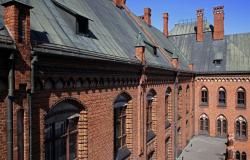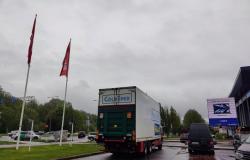Photo: Photo: Ieva Ābele, Saeima/Flickr
The Latvian Association of Doctors, the Latvian Beekeeping Association and the Latvian Organic Agriculture Association oppose the Saeima deputies’ delay in providing rural residents with real protection from the effects of chemical pesticides. In the opinion of the organizations, the implementation of population protection measures is being deliberately delayed in the interests of pesticide users.
The use of agricultural pesticides at a greater or lesser distance from the home affects at least 225 thousand households in rural areas, informs the Association of Latvian Doctors.
In recent months, the collective submission of Latvian citizens “On banning the use of pesticides near inhabited rural houses” has returned to the agenda of the Environment, Climate and Energy Subcommittee of the Saeima National Economy, Agrarian, Environmental and Regional Policy Commission, for which more than 11 thousand citizens have signed on the participation platform “Mana balssis”.
However, the majority of MPs involved in the discussion are deliberately trying to delay the progress of the already delayed initiative. It was submitted to the Saeima in October 2020, initially requesting to ban the use of pesticides within a kilometer of inhabited rural houses. Later, in the project of solutions developed by the Ministry of Environmental Protection and Regional Development, the radius of the ban on the use of pesticides was reduced to 25 meters.
Article 111 of the Constitution states that the state protects people’s health. On the other hand, according to Article 115, the task of the state is to ensure the citizens’ right to live in a favorable environment.
We would like to emphasize that economic interests should be balanced with public interests and environmental protection, not only in forest management, as was highlighted by the recent verdict of the Constitutional Court on the cancellation of the norm of cutting smaller diameter trees, but also in agriculture.
This means that the model of the agricultural system needs to change so that polluters take more responsibility for their impact on the environment and the quality of life of those living nearby. At the same time, it should be noted that the protection of public health and the environment should not be a voluntary measure followed by only a part of farmers, but should apply to all users of pesticides. Agriculture is subsidized from the public purse, but the ability of citizens to assert their rights in matters related to risks from the spread of pesticides has so far been very limited.
We invite you not only to stop the increase in the consumption of synthetic pesticides in Latvia, but also to develop a mechanism for controlling the use of pesticides, which would include physical protection of those living nearby from the effects of pollution (by defining a buffer zone), timely notification of residents about the use of chemical pesticides, the creation of a compensation fund (for example, in cases where pesticides enters the production of other food producers, thus causing losses), as well as the introduction of a strengthened environmental monitoring system.
“Every citizen of Latvia has the right to health. These rights must be the basis for guiding all subsequent decisions. Pesticides are toxic substances for all biological beings, including humans. Ingestion of excessive doses of pesticides (inhalation, skin contact, ingestion) causes severe cases of acute poisoning, but also in relatively small doses, but regular intake of pesticides has adverse effects on human health in the long term, causing not only damage to the respiratory, endocrine, reproductive, nervous and immune systems , but also harms other systems in our body. Pesticide exposure during pregnancy poses serious health risks to the fetus. The global “boom” of diseases such as oncological, autoimmune, neurodegenerative diseases and infertility in couples is connected with the intensive use of pesticides in agriculture and food production,” comments Ilze Aizsilniece, president of the Latvian Association of Physicians.
“The misuse of pesticides is a very painful issue for beekeepers, as it affects not only the beekeeping industry and products, but also the health of the honey bees on the farm. Honey bees are very important in our ecosystem because they participate in plant pollination together with other insects. Therefore, politicians and civil servants must finally regulate the distribution and use of pesticides so that their use is fair and transparent. So that beekeepers and producers of organic agricultural products in Latvia also have equal opportunities to farm alongside other farmers. Politicians must be able to take responsibility in this matter and ensure effective protective measures against pollution caused by pesticides, taking care of the health of Latvian citizens and preserving the environment,” adds Guntars Melnis, Chairman of the Board of the Latvian Beekeeping Society.
“We have come to a situation where we have to conclude – the voice of the public is being run over with a bulldozer like a grasshopper. At the same time, a dangerous myth is deliberately cultivated that pesticides are like vitamins and that we use them sparingly. However, “Eurostat” statistics show that Latvia is not only the leading country in the entire EU in terms of the growth rate of pesticide use in the past decade, but also that the use per hectare of arable land in Latvia is higher than elsewhere in the Baltics and the nearest Nordic countries. At a time when we are experiencing the emptying of regions, improving the quality of life in rural regions should be among the country’s priorities, but the opposite is happening – we continue to threaten those living in the countryside in the name of narrow economic interests. It is also expected that we will encounter more and more cases when the migrating pesticide pollution from the neighboring field will affect producers of organic products, causing large losses that the state will have to compensate,” says Raivis Bahšteins, chairman of the board of the Latvian Organic Agriculture Association.
Read also: Dog feasting on chocolates has cost its owner 2,000 euros
Read also: Don about Eurovision: It’s not as if we are welcomed there with open arms
Read also: Mortality is high – an oncologist reveals the best way to prevent cancer
Read also: The husband of the missing Anna Janson: I shouldn’t tell my daughter that mom won’t come again
Read also: Metal plates in the face for life – Strands reveals injuries sustained in accidents with scooters in Latvia
Read also: Do, protect, soothe – zodiac signs in one verb
Follow us on Facebook too, X, Instagram and Friends!
Tags: Saeima members criticized efforts stifle pesticide restrictions Latvia
-





